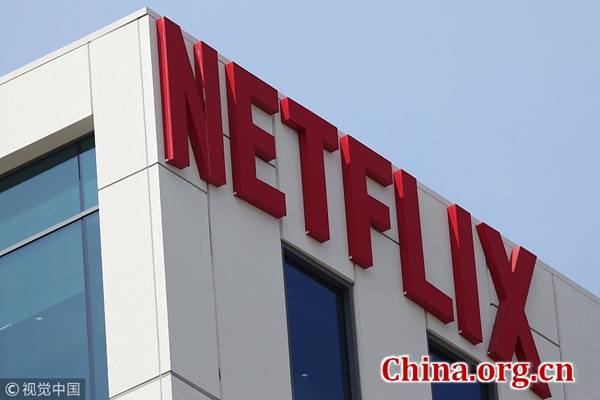How Netflix is changing the film industry
- By Mitchell Blatt
 0 Comment(s)
0 Comment(s) Print
Print E-mail China.org.cn, January 20, 2019
E-mail China.org.cn, January 20, 2019

The Academy Awards are a month away, and the winner of Best Picture might be a film that streamed directly into people's homes.
Nominations for the Academy Awards will be announced on January 22, and critics are sure "Roma," which was distributed by Netflix, will be among the eight to ten films selected for the Best Picture finalists. It already took home top prizes at the Golden Globes as the best foreign language film, and its director, Alfonso Cuarón, won best director.
It would not be the first time a film distributed by Netflix was nominated for an Oscar. Eight Netflix films have been nominated before, and "The Ballad of Buster Scruggs" made the Oscar shortlist, announced in December, for best original score.
Since its first original film in 2015, Netflix has increased its output exponentially. In 2018, Netflix acquired and distributed 37 original films, which feature acclaimed actors like Sandra Bullock ("Bird Box") and directors like Joel and Ethan Coen ("Buster Scruggs").
The increasing popularity and critical acclaim heaped upon Netflix films has industry executives worried. Last November, the Washington Post's entertainment and business reporter Steven Zeitchik quoted Hollywood figures as blaming Netflix for a decline in the number of tickets sold for "prestige films" at theaters. Steven Spielberg said he doesn't think Netflix films should be eligible for Oscars.
But is it really a problem if viewers watch at home instead of on the silver screen? Netflix is paying big money for the rights to acquire films. In 2018, Netflix spent an estimated US$13 billion on original content. For its original series, Netflix deals in one- or two-year guaranteed contracts, which are much more secure than arrangements made by established television networks.
Netflix has been great for some TV shows that benefited from being exposed to an audience hungry for entertainment. "Breaking Bad" producer Vince Gilligan credited Netflix with having "kept us on the air."
It has also given filmmakers and series showrunners a great degree of creative freedom. As Joel Coen said, "They're the people who are stepping up and spending money on movies that aren't Marvel comic movies or big action franchise movies and that type of thing."
Industry researcher Stephen Follows found that 30 percent of the 100 top-grossing Hollywood movies in 2017 were sequels or prequels, a figure that has gone up steadily from 10 percent in 2005. The proportion of remakes has blissfully been declining since 2005, though it inched up between 2016 and '17 to 4 percent. As I wrote last year, the trend of remakes is making its way to Chinese cinema, too.
Netflix, then, is not destroying film. It might even be saving the film industry from becoming antiquated and overly concentrated on a single model with a single form of distribution, single-minded industry elites and fixed ideas.
Competition helps spur innovation and gives consumers more choices. Netflix is not causing the movie viewing audience to decline or depriving filmmakers of revenue. Rather, it is just moving revenue from one platform to another.
In fact, in coming years, we are bound to see even more money spent on original content, as Netflix will be competing against new entrants into the market. Disney and Warner Media, among others, will soon be launching streaming services of their own. Those companies, which already own a vast collection of their own content spanning decades, will have great leverage over Netflix when it comes to rights. Already Disney has plans to take Marvel films off Netflix and offer them exclusively on its own platform.
At the same time, too many competitors could pose a new problem for consumers. It would be inconvenient and wasteful to have to pay for multiple accounts on multiple platforms. Not only that, but films have long been a mass medium that crosses class and location. Foreigners in China can even break the ice with new Chinese friends by talking about movies. But will movies be increasingly constrained inside the walls of each exclusive content distributor?
The amount of competition in the streaming industry, fortunately, is inherently limited. The business of streaming relies on critical mass – of content and of consumers. Without content, no streaming company can attract consumers, and without many consumers, no company can make any profit. It is a business with high fixed costs and low marginal costs. Such businesses need a very large consumer base, each paying a comparatively small membership fee.
While Netflix still does not own the vast majority of its content, it does have one thing traditional studios don't have: over 130 million viewers. It also has a big lead on developing algorithms and tracking users' behavior. Production companies would be losing out on a huge audience if they pulled their films and TV shows off Netflix.
In the end, increased competition will likely result in increased prices before the market eventually settles at equilibrium with a few credible streaming services remaining, perhaps each with a unique selling point. It's too early to say whether the new paradigm will be good or bad for consumers on the whole, but I am cautiously optimistic. No one today misses Blockbuster video rentals.
Mitchell Blatt is a columnist with China.org.cn. For more information please visit:
http://www.china.org.cn/opinion/MitchellBlatt.htm
Opinion articles reflect the views of their authors, not necessarily those of China.org.cn.






Go to Forum >>0 Comment(s)